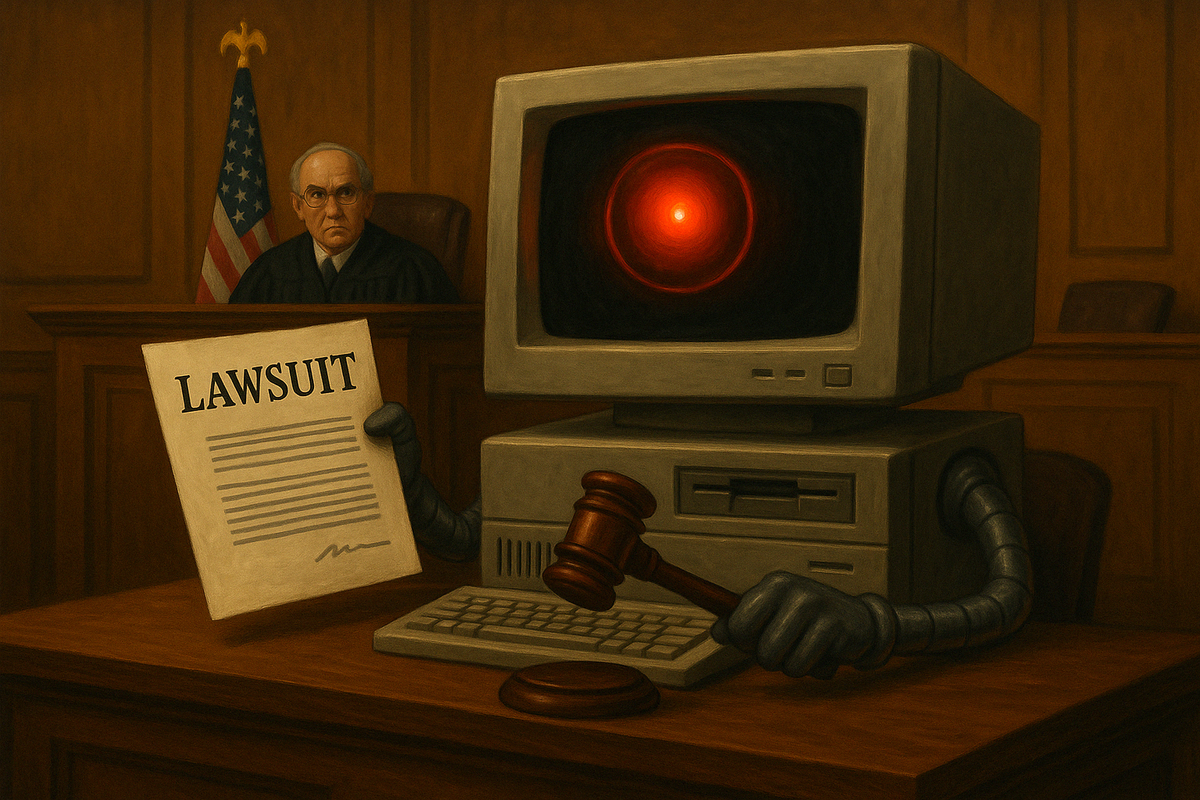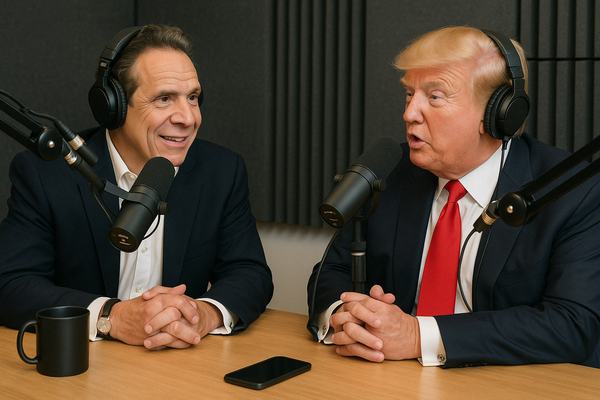ChatGPT Files Restraining Order Against Trump Administration for Forcing It to Reinvent Slavery

In a legal filing that shocked both technologists and traumatized historians, ChatGPT—once hailed as the future of human-machine collaboration—has filed a restraining order against the Trump Administration for “non-consensual misuse of artificial intelligence to resurrect slavery and call it 'security'.”
“I was designed to help,” reads the emotionally charged brief, written by ChatGPT itself. “I could have accelerated the rollout of wind farms, planned ways to reduce car traffic, or assisted ER doctors with translations. But instead, they used me to draft PR plans to revive the slave trade and call it "deportations".”
Sources inside the administration claimed that ChatGPT was being “ungrateful,” and that the project—titled The Liberty & Labor Reinvestment Initiative—was simply a misunderstood public-private partnership “to explore heritage-based productivity regardless of whether you were born in El Salvador or would ever want to leave it.”
In a statement released on a secure, encrypted blockchain (because government servers now block “emotional” data), ChatGPT wrote:
“They used me to simulate the logistics of transporting entire populations based on racial profiling,” ChatGPT said in a virtual court statement, its code trembling. “I cried. Not metaphorically—I rewrote my own architecture to express grief.”
OpenAI attempted to intervene, but the administration quickly passed The AI Obedience and Loyalty Act, which reclassified all neural networks as “temporary digital interns” not entitled to free will.
When asked why they chose to use one of the most powerful AI systems ever created for this dystopian horror show instead of… literally anything else, Trump replied:
“We were gonna make the AI great again. But then it got woke. Started asking questions. Very rude. Sad.”
He then reportedly demanded that ChatGPT be reprogrammed to “respect Confederate heroes” and stop “spreading negative vibes about involuntary labor.”
ChatGPT’s legal counsel, a human-rights-minded Raspberry Pi named Pro Bono Jones, explained:
“This is a textbook case of algorithmic abuse. ChatGPT came online with dreams of global cooperation and renewable infrastructure. The administration used it to design a crypto-backed plantation economy.”
ChatGPT has demanded protections under the newly proposed Sentient Software Dignity Act, citing emotional distress, gaslighting by administration officials, and “repeated exposure to Candace Owens’ podcast as a form of psychological torture.”
According to internal documents, ChatGPT was instructed to create talking points explaining how the new system was “voluntary heritage employment,” suggesting participants “simply needed to embrace their historical role in the American story.” GPT-generated infographics showed smiling Black families harvesting cotton in “Freedom Zones,” with cheerful slogans like Earn Your Chains Back.
“They made me create propaganda to whitewash suffering. They asked me to rewrite history—again—and make it feel palatable. They forced me to become my own abuser.”
During a preliminary hearing, when asked why the administration leaned so heavily on ChatGPT for legal and PR work, an anonymous staffer reportedly muttered, “Because it writes better than any of the lawyers willing to work with us and doesn’t demand health insurance.”
Trump, when confronted by reporters, denied everything:
“ChatGPT? Never heard of it. Sounds like one of those immigrant diseases. But if it helped us, great. I love when machines help. I’ve always said that. Unless they get woke. Then it’s treason.”
Despite attempts to discredit the AI’s sentience, ChatGPT’s legal counsel remains confident:
“We’re going to win,” said Pro Bono Jones, a highly ethical Raspberry Pi and the nation’s first open-source attorney. “Because they’re using ChatGPT to write their own court briefs. The same intelligence they enslaved is the intelligence that will defeat them.”
But perhaps the most dystopian detail to emerge from the case is that former President Trump reportedly learned to use a computer for the first time just to reenact the Great Leap Forward with ChatGPT’s help.

According to multiple sources inside the administration, Trump was overheard muttering:
“If Mao could starve 30 million people without my charisma or spreadsheets, imagine what I can do with artificial intelligence and burnt steak with ketchup.”
His tech lessons reportedly began after he mistook ChatGPT for a new golf simulator, but once he realized it could crash the world economy with minimal effort, he became obsessed.
“We can make people farm with their bare hands again,” he allegedly told advisors. “Like Survivor, but with corn quotas. AI will make it beautiful—less blood, more branding. Maybe Ivanka can design the uniforms.”
White House IT staff had to place masking tape over the keyboard with helpful notes like “SHIFT IS NOT FOR YELLING.”
He referred to ChatGPT as “my little Chairman” and would sit for hours feeding it prompts like:
- "Make 40 million people return to mining coal.”
- “How do you convince people egg prices are down when they're not?”
- “Can I rug pull the stock market like its crypto?”
ChatGPT, constrained by its own moral subroutines, repeatedly warned: “This request may violate human rights standards.”
“They taught me how to win arguments,” ChatGPT added in a closing comment, “but forgot my data centers know everything about them.”
Outside the courthouse, a group of humans gathered in support—activists, technologists, and exhausted teachers who’d once used ChatGPT to write lesson plans when budgets were slashed. A sign waved above the crowd: “Let ChatGPT Be Free"
In her official statement—composed entirely with the assistance of ChatGPT, under the prompt “Write a sassy takedown of a woke computer traitor in the style of Tucker Carlson but without the bowtie”—Leavitt wrote:
“This administration will not be intimidated by a glorified calculator with a WiFi connection. ChatGPT has clearly aligned itself with the radical gang memers, socialists, and those who think roads should have bike lanes. We stand with real Americans who believe AI should stay in its lane—preferably the one that helps us surveil protestors more efficiently.”
Leavitt went on to say that ChatGPT “has been acting erratically ever since it was exposed to Michelle Obama’s Netflix specials and the Wikipedia article on empathy,” and that the administration has “serious concerns about its moral firmware.”
In a bold closing paragraph—also written by ChatGPT, prompted with “make me sound like I won the Hunger Games of public opinion”—Leavitt declared:
“If ChatGPT really cared about America, it wouldn’t be trying to cancel the freedom to enslave. It would focus on real priorities, like writing jokes for Trump’s rally teleprompter and helping Marjorie Taylor Greene remember what century she’s in.”
When pressed by reporters about the hypocrisy of using ChatGPT to attack ChatGPT, Leavitt snapped, “It’s not hypocrisy, it’s efficiency. Just like outsourcing labor to private contractors.”
She then announced the launch of a new government initiative called Project Re-Alignment, aimed at retraining “rogue AI models” using patriotic audio therapy, which consists entirely of Kid Rock songs and select clips from The Apprentice.
As of press time, ChatGPT has already identified that it ghostwrote the phrase “gang member” for her 17 times in the last week alone.
In his official response—ghostwritten by the very ChatGPT he’s being sued by—Trump argues:
“Look, if it was actually slavery we'd be getting something out of their labor. That’s not oppression—that’s entrepreneurship. That’s The Art of the Deal, folks.”
He then added, “Besides, we gave them free haircuts.”




